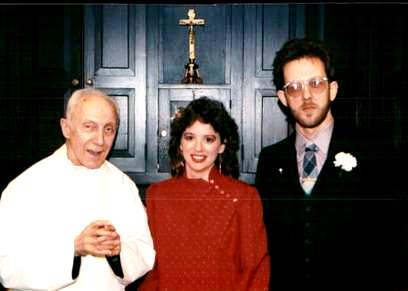
(8-26-06)
***
[This was a chapter intended for my book, The One-Minute Apologist (2007), but not included in the final draft]
SACRAMENTALISM
Catholics believe that sacraments give grace even if one is in unrepentant sin
Isn’t that the point of ex opere operato?
Initial reply
Sacraments possess an inherent power to give grace, yet the effect is hindered or rendered null and void if the recipient is in serious sin.
Extensive reply
The Catholic belief about the efficacy of sacraments is expressed by the fancy Latin phrase ex opere operato. Eminent catechist Fr. John A. Hardon, S. J., explains:
Literally the expression means “from the work performed,” stating that grace is always conferred by a sacrament, in virtue of the rite performed and not as a mere sign that grace has already been given, or that the sacrament stimulates the faith of the recipient and thus occasions the obtaining of grace, or that what determines the grace is the virtue of either the minister or recipient of a sacrament. Provided no obstacle (obex) is placed in the way, every sacrament properly administered confers the grace intended by the sacrament. In a true sense the sacraments are instrumental causes of grace. (Modern Catholic Dictionary, Garden City, New York, Doubleday & Company, 1980, “Ex Opere Operato,” 201)
The key here is the notion of “obstacle.” Fr. Hardon continues in his entry on “Obex” (Ibid., 384): “These obstacles are mainly a lack of faith, or of the state of grace, or of a worthy intention.” This is how the Catholic Church harmonizes the dual truths of inherent sacramental efficacy (over against Protestantism and the ancient Donatists) and the corresponding responsibility of the recipient. Fr. Hardon continues in his entry on “Sacramental Dispositions” (Ibid., 477):
Condition of soul required for the valid and/or fruitful reception of the sacraments . . . In the recipient who has the use of reason is required merely that no obstacles be placed in the way. Such obstacles are a lack of faith or sanctifying grace or of a right intention.
So it is clear that the Church does not teach that the sacraments absolutely “work” in every case, regardless of the person receiving them. That would be the false opposite extreme from the error of thinking that the sacraments do not transmit grace by their very nature. The Catechism of the Catholic Church, in its section on ex opere operato (#1128), also notes: “Nevertheless, the fruits of the sacraments also depend on the disposition of the one who receives them.” The Holy Eucharist, for example, is not to be received by anyone in mortal sin (based on 1 Corinthians 11:27-30). The Catechism teaches:
1415 Anyone who desires to receive Christ in Eucharistic communion must be in a state of grace. Anyone aware of having sinned mortally must not receive communion without having received absolution in the sacrament of penance.
Objection
But don’t many Catholics often go out and sin, confess and then receive Holy Communion, and do this over and over? Isn’t that minimizing the seriousness of sin, by virtue of this sort of “mechanical” sacramental system?
Reply to Objection
Individual Catholics may often fall short, of course, as do Christians in all denominations. But what the Church actually teaches in this regard is that a Catholic going to confession must first exhibit sincere contrition, or else the absolution or forgiveness received by the priest is of no effect (never actually occurring), since the necessary conditions to receive it were missing. The Catechism, citing the Council of Trent, defines contrition, or repentance as “sorrow of the soul and detestation for the sin committed, together with the resolution not to sin again” (#1451), and Fr. Hardon states: “an act of contrition is required for the remission of sin, whether with or without sacramental absolution” (Ibid., 130).
Someone who is committing the same grave sin continually has obviously not made a serious or sincere resolution to cease. Therefore, he could not actually receive absolution during confession. The “do whatever you want and just confess it” mentality and caricature of supposed Catholic teaching is thoroughly foreign to how the Church views the sacrament of reconciliation, or confession. It is just as wrong as the fringe antinomian distortions of “faith alone” among Protestants.
Constitution on the Sacred Liturgy (Sacrosanctum concilium: 4 December 1963):
But in order that the liturgy may be able to produce its full effects it is necessary that the faithful come to it with proper dispositions, that their minds be attuned to their voices, and that they cooperate with heavenly grace lest they receive it in vain. Pastors of souls must, therefore, realize that, when the liturgy is celebrated, something more is required than the laws governing valid and lawful celebration. It is their duty also to ensure that the faithful take part fully aware of what they are doing, actively engaged in the rite and enriched by it.
Mother Church earnestly desires that all the faithful should be led to that full, conscious, and active participation in liturgical celebrations which is demanded by the very nature of the liturgy . . . In the restoration and promotion of the sacred liturgy the full and active participation by all the people is the aim to be considered above all else, for it is the primary and indispensable source from which the faithful are to derive the true Christian spirit.
(Chapter 1, I, section 11 and II, section 14; emphasis added; from the 1988 revised edition of the Vatican II documents, edited by Austin Flannery, O.P., 6-8)
***
Photo credit: Servant of God Fr. John A. Hardon, S. J. (d. 2000), who received me into the Church on this day (2-8-91), heard my wife Judy’s confession, so she could return, and sacramentalized our marriage (due to defect of form). He also baptized our first two sons. Our personal photo.
***












